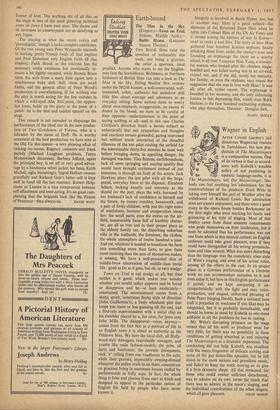Wagner in English
AFTER Covent Garden's last disastrous Wagnerian venture in Tannhauser, the new pro- duction of The Mastersingers is a comparative success. One of its virtues is that in accord- ance with Kubelik's sensible policy of not pandering to operatic language-snobs, it is The Mastersingers, not Die Meistersinger. No- body can feel anything but 'admiration for the resourcefulness of the producer Erich Witte in taking over himself the part of Walther after the withdrawal of Richard Lewis. But admiration does not ensure enjoyment, and there were a good many in the opera house besides Beckmesser on the first night who were marking his faults and grimacing at his style of singing. Most of this display came from those amateur connoisseurs who pride themselves on their intolerance, but it must be admitted that his performance was not one from which in this musical context an English ' audience could take great pleasure, even if they could have disregarded all his wrong pronuncia- tions and false accents. What was more disturbing than the language was the completely alien style of Witte's singing, and even of his actual voice, among all the others in the cast. In its proper place in a German performance of a German work we can accommodate ourselves to it and even enjoy it, but here in this English performance it jarred, and we kept comparing it un- sympathetically with the light and easy voice- production, and elegant, unhurried phrasing of Peter Pears (singing David). Such a national taste (call it prejudice or weakness if you like) may be misguided, but it is probably ineradicable, and should be borne in mind by Kubelik as one more addition to all the problems he has in casting.
Mr. Witte's disrupting presence on the stage meant that all his work as producer went for very little, for there was no possibility in these conditions of getting absorbed in and enjoying 7'he Mastersingers as a dramatic experience. The conducting did not help. Kubelik was excellent with the many fragments of delicate scoring and some of the gay dance-like episodes, but he fell down in the more serious and grandiose music, and failed to keep the work moving or to give it a firm dramatic shape. All that remained, for those who could muster suflicient detachment, was to admire on its own terms the much that there was to admire in the tenor's singing, and the individual contributions of the other singers,


































 Previous page
Previous page